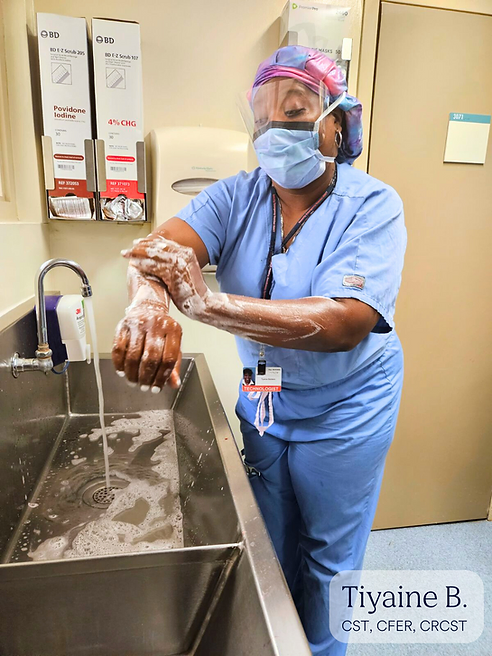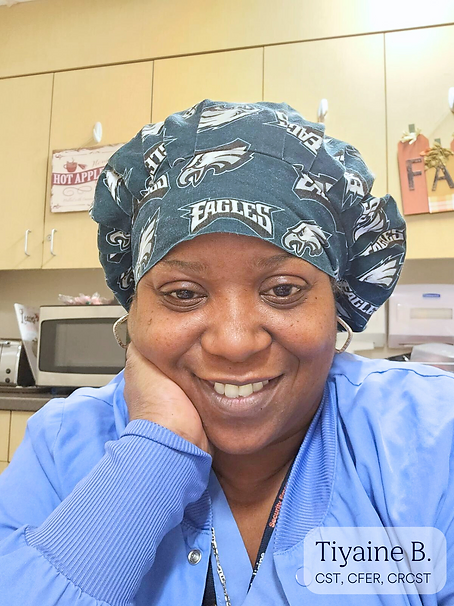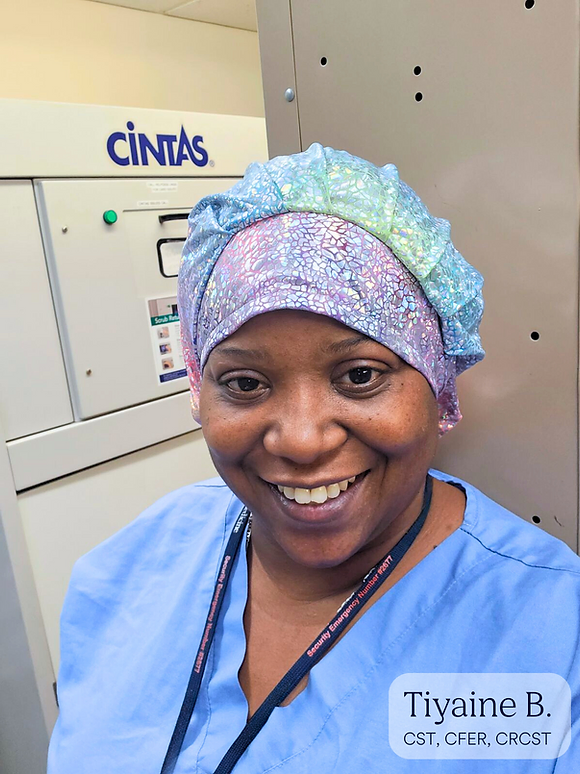
The Essential Role of Medical CSTs: Insights from Tiyaine B. (CST, CFER, CRCST)
September 22, 2023
Surgical technologists play a critical role in today’s healthcare landscape, ensuring surgical procedures run smoothly and efficiently. As the demand for skilled professionals in operating rooms continues to rise, understanding the day-to-day experiences, challenges, and rewards of this career has never been more important.
We had the privilege of speaking with Tiyaine B, CST, CFER, CRCST, a surgical technologist with over two decades of experience. Tiyaine brings to light the essential role surgical technologists play in a field that often operates behind the scenes.
In this candid interview, Tiyaine shares her thoughts on the challenges and rewards of being a surgical tech, offering valuable insights for those considering a career in this field.
A Quick Primer: What is a CST?
A Certified Surgical Technologist, or CST, is a healthcare professional who assists in surgical procedures. To become a Certified Surgical Technologist, one typically completes an accredited surgical technology program and passes a certification exam. This certification ensures that the individual has the necessary knowledge and skills to perform effectively in the operating room.
“They are the surgeons’ co-pilots, passing them instruments and supplies before, during, and after operations, often without needing to be asked.” — Penn Medicine News, 2022
Now, without further ado, let’s hear firsthand from Tiyaine B. about her journey, motivations, and experiences in this essential healthcare profession.
Q&A with Tiyaine B., CST, CFER, CRCST
Q: What inspired you to pursue a career in the medical field, particularly as a Surgical Technologist?
A: My inspiration came from witnessing my grandmother have a heart attack when I was young. I felt powerless at that moment, and I knew I needed to learn how to help in situations like these. Since 1997, I’ve been a surgical technologist. I’ve gained three certifications to expand my career: Certified Surgical Technologist (CST), Certified Flexible Endoscope Reprocessor (CFER), and Certified Registered Central Service Technician (CRCST). In the OR, I treat each patient with the care I would want for my loved ones. Being there for the patient during every moment of their surgery is my commitment.


Q: What advice would you give to someone considering a career in surgical technology?
A: My advice is to treat every patient as if they were your loved one. Advocate for them when they cannot speak for themselves. Safety, dignity, and respect are crucial. It’s our job to ensure the patient is protected and cared for at every moment. Don’t hesitate to stand up for the patient’s well-being, and as John Lewis wisely said, “Never, ever be afraid to make some noise and get in good trouble, necessary trouble.”

Q: Working in the operating room can be intense. How do you cope with the most difficult days on the job?
A: If your heart is not in it, it’s not for you. It’s not about money. It’s about caring for others. You need to build resilience and strength because not every day will be the best, but every day can still be a good day with the right perspective. What gets you through it is having faith in a higher power. For me, it’s in Christ, but having something to believe in is essential. In this career path, you will encounter life-and-death situations, and you can stand for hours during surgery, sometimes witnessing a life being lost. It’s not easy, but having faith gives me the strength to face each day. I can’t detach because I care deeply. I always take a moment in the OR to acknowledge a loss, as if it could be someone I love.

In the world of healthcare, surgical technologists play a crucial role in ensuring the safety and success of surgical procedures. Tiyaine’s advice to treat every patient as a loved one, advocating for their well-being, echoes the core values of this profession. Her commitment to patient care, coupled with unwavering faith, highlights the resilience and strength required to navigate the intense environment of the operating room.
As we celebrate National Surgical Technologist Week, let us remember and appreciate the contributions of these dedicated professionals who work tirelessly behind the scenes to make a difference in the lives of patients. Their faith, commitment, and advocacy truly exemplify the spirit of healthcare. If you're ready to explore CST roles and make an impact, view available job opportunities to find your next career opportunity through GHR.
Thank you, Tiyaine, for sharing your perspective and for your continued dedication to the field of surgical technology.
Some Definitions:
CFER – Certified Flexible Endoscope Reprocessor
CFER is a certification for professionals responsible for cleaning, disinfecting, and sterilizing flexible endoscopes and related equipment. Flexible endoscopes are medical devices used for minimally invasive procedures, such as gastrointestinal or bronchial examinations. CFER certification demonstrates expertise in the proper handling and maintenance of these critical medical instruments, ensuring patient safety and infection control.
CRCST – Certified Registered Central Service Technician
CRCST is a certification for individuals working in central service or sterile processing departments of healthcare facilities. Central service technicians are responsible for cleaning, sterilizing, and distributing medical instruments and equipment used in surgical procedures. CRCST certification signifies that the individual has met the required standards for competency in central service and sterile processing, contributing to patient safety by maintaining the cleanliness and sterility of medical instruments.
Subscribe to GHR's Blog Newsletter
Your submission was successful.
Thank you for subscribing — we'll be in touch!





